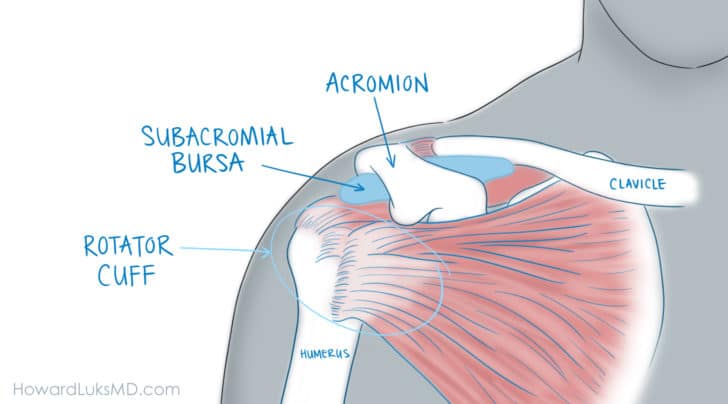
Shoulder pain at night is a prevalent and potentially debilitating problem. For some of you, the pain is sharp when you change your sleeping position. For others, you will complain of a constant dull ache that doesn’t seem to go away. Sleeping with your arm under your head can be very challenging if you have shoulder pain at night. Most of you eventually find that sleeping on your back, or even in a recliner is the only way to get some sleep. This post will explore the most common causes of night pain in your shoulder. We will also review some potential remedies for easing your shoulder pain that worsens at night.
If you have shoulder pain at night, you know how disruptive it can be! Inflammation within your shoulder and usually in the region of the rotator cuff muscles is a leading cause of night pain. The specific structure that’s involved is called the subacromial bursa, a fluid-filled sac overlying the rotator cuff.
The 5 most common issues that can affect the rotator cuff and cause shoulder pain at night:
- Subacromial bursitis– inflammation of the tissue around the rotator cuff.
- Calcific tendonitis– calcium often forms inside the rotator cuff. When it starts to dissolve, the inflammation can be intense.
- Rotator cuff tears- the pain associated with rotator cuff tears is likely due to irritation of the surrounding subacromial bursa. See the pictures below.
- Rotator cuff tendonitis– Tendonitis of the rotator cuff can occur from an increase in activity that the shoulder is not used to.
- Frozen shoulder: inflammation throughout the shoulder joint, often leading to stiffness of the shoulder.
The most common cause of shoulder pain at night
As many of you know, no matter which side you try to sleep on, your shoulder pain wakes you up. Eventually, this will start to affect your quality of life and your psychological well-being significantly.
Inflammation of the rotator cuff and shoulder bursitis are probably the most common reasons why you cannot lay down and sleep through the night. The subacromial bursa is a small sack that sits on top of the rotator cuff tendons. A healthy bursa will lubricate the rotator cuff tendons in the shoulder to minimize friction between the rotator cuff and the bones of the shoulder.
The bursa can become inflamed because of various rotator cuff issues. Once angered, the bursa is likely responsible for a significant amount of your night pain.
Down below, we will cover ways to get this bursitis to quiet down.
The pain from bursitis is often on the outer side, or front of the shoulder. It is not usually on the top of the joint. Most people will complain of a deep dull ache. Some of you may feel a grinding or clicking sensation in the shoulder. The grinding is usually due to inflammation of the bursa and not a bone spur.
Very few of you will recall an injury that caused your night pain. Most of the time, there was no readily identifiable injury. That makes night pain in your shoulder very frustrating. You cannot identify an activity that caused it.
Most people who simply wake up with shoulder pain one day didn’t do anything wrong per se. The incidence of shoulder pain increases as we age. A frozen shoulder is a classic example. A frozen shoulder is a common cause of night pain. When you suffer from a frozen shoulder, you will find it difficult to sleep at night. That is due to intense inflammation within the shoulder joint itself. We often do not know what causes a frozen shoulder. The treatment of a frozen shoulder was discussed at length in this post.
Of course, recent sports injuries or overuse injuries to the rotator cuff can also cause significant pain at night. Injuries to the rotator cuff can also cause secondary inflammation of the bursa. Simply stated, if you suffered an injury from a fall and injured your rotator cuff muscle, the bleeding from that injury can cause inflammation in the bursa that abuts the rotator cuff.
Keep reading down below, and we will cover ways to get more comfortable and hopefully sleep through the night.
Why Does My Shoulder Hurt At Night?
Here is a list of the most common problems that cause shoulder pain at night. You can follow the links to read about each diagnosis, or you can keep scrolling down for remedies to try and get the pain to simmer down.
- Rotator cuff tear
- Rotator cuff tendinosis
- Calcific Tendonitis
- Tendonitis/Bursitis and inflammation.
- Frozen shoulder
- AC Joint Arthritis
- Tendonitis of the biceps
- Labral tears do not cause night pain.
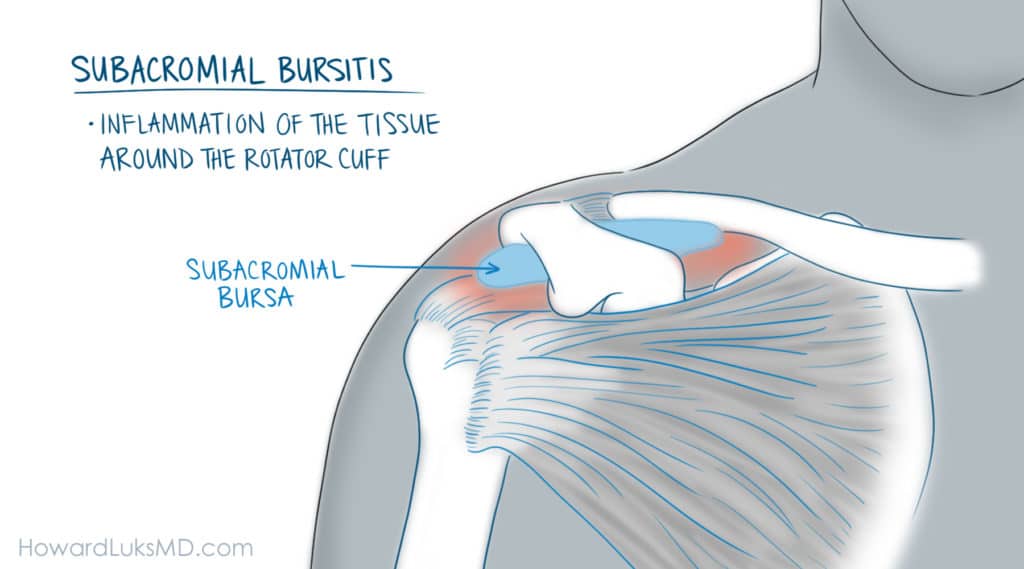
If the rotator cuff begins to degenerate enough, it may start to tear. A small tear is referred to as a partial rotator cuff tear. The rough surface of the rotator cuff tendons due to a partial tear can irritate or inflame the bursa sitting on top of the rotator cuff. Your shoulder might hurt with certain activities too… but it is the night pain that usually makes you call our office.
Some of you have injured yourself or fallen onto your arm, and now your shoulder pain is keeping you up at night. For those of you with night pain following an injury, a more severe full-thickness rotator cuff tear is possible. You should have your shoulder evaluated sooner rather than later.
What is the Treatment of Severe Shoulder Pain at Night?
The goal of treating people with severe night pain is to limit the inflammation within the shoulder, and more specifically, within the subacromial bursa. For most of you, this will be a temporary issue. Short term anti-inflammatory medications, perhaps an injection, and physical therapy, will have you sleeping well again in a few weeks. For some of you, the pain will persist, despite these often effective modalities.
It’s the middle of the night, and you’re having a hard time getting to or staying asleep. A combination of these treatments below can help ease your pain:
A heating pad
Yes, a heating pad. Used carefully (do not fall asleep with it on), and often, a heating pad can provide a surprising amount of relief. If your shoulder is not allowing you to sleep and you can’t get in to see your shoulder specialist, this is an excellent place to start. Many people think that ice is most appropriate for this type of inflammation… but a surprising number of you will feel better with a heating pad. They should be applied for 15 minutes, then taken off for 15 minutes… you can continue 15 minutes on/15 minutes off for as long as needed.
Sleeping in a reclining chair.
Sleeping in the semi-sitting position can help many people with severe shoulder pain get to sleep. You can also prop yourself up on a couch or in bed with many pillows to get yourself elevated at least 45 degrees. Putting a small rolled-up towel behind your shoulder to push it forward can also help minimize the pain you are experiencing.
Capsaicin:
Capsaicin is an over the counter ointment or rub. It functions as a counter-irritant. Capsaicin causes a burning sensation. In some people, it can cause an actual burn, so be careful and follow the instructions. When you rub capsaicin in the area where you have the pain, scientists believe that the skin irritation depletes a chemical from your nerves. By depleting that chemical, it is thought that this will quiet down the nerves around the bursa and the rotator cuff in the shoulder.
An Ice Compression sleeve:
An ice compression wrap: These ice sleeves seem to be useful at minimizing your pain at night and allowing you to fall asleep. Many patients have commented over the years that these sleeves have been helpful. Again, heating pads are useful, as well. Some people prefer ice, and some prefer heat. There is little chance of harm, so try both until you find what works best for you. These ice compression sleeves are also useful and improve your pain following a rotator cuff overuse injury, or surgery.
Shoulder Injections for Night Pain:
When you are in our office, we will discuss options to improve your night pain. Not being able to sleep is very disturbing, so you may want to consider an injection. Injecting cortisone or a steroid into the bursa can be one of the fastest means of achieving meaningful pain relief.
Injections into the subacromial bursa, that area above your rotator cuff that tends to become inflamed, can be beneficial in some circumstances. We know that routine cortisone injections are not the best idea. Frequent injections near tendons can cause the tendons to degenerate further.
Injections of cortisone into the bursa, however, can be beneficial in people who are very unhappy because they cannot sleep. These injections often start working in one day and continue to work for a few weeks to months, so you can begin recovering from your loss of sleep.
Kinesio Tape:
Kinesio tape seems to work well with many conditions to calm down the pain that people experience at night and even with certain activities during the day. The tape likely functions through a complex feedback interaction with the nerves of the spinal cord and brain. The pattern of taping doesn’t appear to be critical. Kinesio tape can be purchased online without a prescription.
Physical therapy:
Physical therapy to address the rotator cuff is beneficial over the long term to help improve your shoulder pain. For patients without severe night pain, then we start with physical therapy and try to avoid injections. If the pain at night is severe, then we usually try an injection first to calm things down and follow that soon afterward with a course of physical therapy. That therapy is generally taken 2-3 times per week for 4-6 weeks.
Many of you can learn the exercises yourself so you can continue the exercises on your own. Maintaining the activities, even after the physical therapy is done is essential to decrease the risk of the pain coming back.
Medications :
Many patients with severe shoulder pain at night require medications to help get them to sleep. At least until the pain starts to improve. Most people will start with NSAIDs like Ibuprofen, Naproxen, and Naprosyn, which are available over the counter.
Those of you with heart disease, ulcers, kidney disease, asthma, or hypertension will want to speak with your doctor or cardiologist first. Those of you on “blood-thinners” should not be taking anti-inflammatory medications.
Combining an NSAID with Tylenol can be even more useful. The two medications together can be very effective at minimizing your pain. The maximum daily dose of Tylenol for a healthy adult with no liver issues is 3000 mg per day. Taking 1000mg every 8 hours is usually the most effective way to take it.
Rotator cuff surgery for night pain:
The vast majority of you will not require surgery to alleviate your night pain. If necessary, surgery has been proven to be effective at helping alleviate the night pain associated with many rotator cuff disorders.
Surgery should be your last choice. But if you do not respond to medications, injections, physical therapy, and changing your sleeping positions, then surgery might be appropriate to consider.
Do you have questions regarding an Orthopedic injury or longevity?
Do you want to talk to an expert who can listen to you for 45-60 minutes and explain the options in detail?
Dr. Howard Luks offers remote guidance sessions to review your X-ray or MRI images and explain your options.
Dr. Luks has also received hundreds of requests for educational sessions on the topics discussed in his book, Longevity Simplified.
Surgery for night pain in the shoulder is arthroscopic. That means that the surgery is performed through small holes with a fiberoptic camera. The procedure we recommend to alleviate night pain is called an arthroscopic decompression. That name implies that we will be decompressing the space above your rotator cuff by removing the inflammatory tissue. During the surgery, we remove the inflammation due to the bursa that sits on top of your rotator cuff.
If necessary, we can also remove calcium from calcific tendonitis; we can release the capsule for a frozen shoulder or repair the rotator cuff if it is torn. The precise shoulder surgery to alleviate your night pain will ultimately be determined by what we believe is causing your night pain.
During the arthroscopy, we also inspect and evaluate the rotator cuff. If the rotator cuff has damage such as a partial tear, then we may consider placing a biological patch that might help to repair a worn-out rotator cuff. That patch is placed after the inflammation is removed, and the rotator cuff is smoothed out to eliminate the degenerative/frayed tendon, which might be irritating your shoulder.
Not everyone who has partial tears or fraying of the rotator cuff will require a patch. Many of us have seen issues in some people after the patch is placed. There is a chance that you will react to the patch– so we tend to use it in people with certain types of deep partial tears, or if we are repairing a degenerative rotator cuff tear.
I Tried Therapy, and My Shoulder Still Hurts At Night
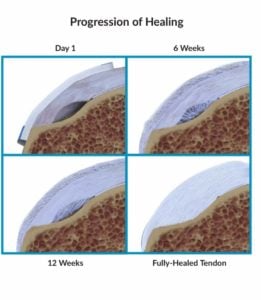
A small percentage of people will not respond to non-surgical treatment. I find that people with severe night pain are usually ready to have surgery sooner. They are miserable …as are those who live with them. Because we have a surgical option proven to diminish or eliminate night pain in your shoulder, it may be a reasonable option for you to consider if you do not respond to non-surgical or conservative treatment.
Research has shown that surgery on your rotator cuff to repair a rotator cuff tear or to treat tendinosis can dramatically improve or eliminate your night pain.
“Sleep disturbance is common in patients undergoing rotator cuff repair. After surgery, sleep disturbance improves to levels comparable with those of the general public. Preoperative and prolonged postoperative use of narcotic pain medication negatively affects sleep.”
Source: Sleep Disturbance Associated With Rotator Cuff Tear
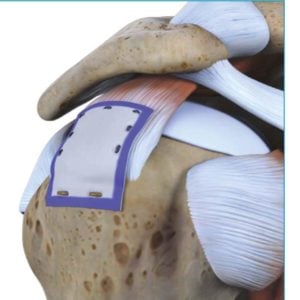
For those of you who injured your rotator cuff from a fall and have developed weakness, as well as night pain, then a repair of your rotator cuff might be your best option.
For patients with severe night pain due to tendinosis or a partial rotator cuff tear, a promising procedure is where we place a small patch into the shoulder during a shoulder arthroscopy (minimally invasive). Using a camera and other instruments, we place the patch over the area of degeneration or tearing. Then biology should take over and slowly regenerate your rotator cuff over time.
The patch usually becomes absorbed into your tendon and “induces” the tendon to heal. Before we place the patch, we will also clear away any inflamed bursa. Removing the inflamed bursa will ease your discomfort. Reversing or improving the tendinosis and partial tear could give you a good chance of not having to deal with this again in the future.
A fair number of shoulder surgeons are currently utilizing this technology.

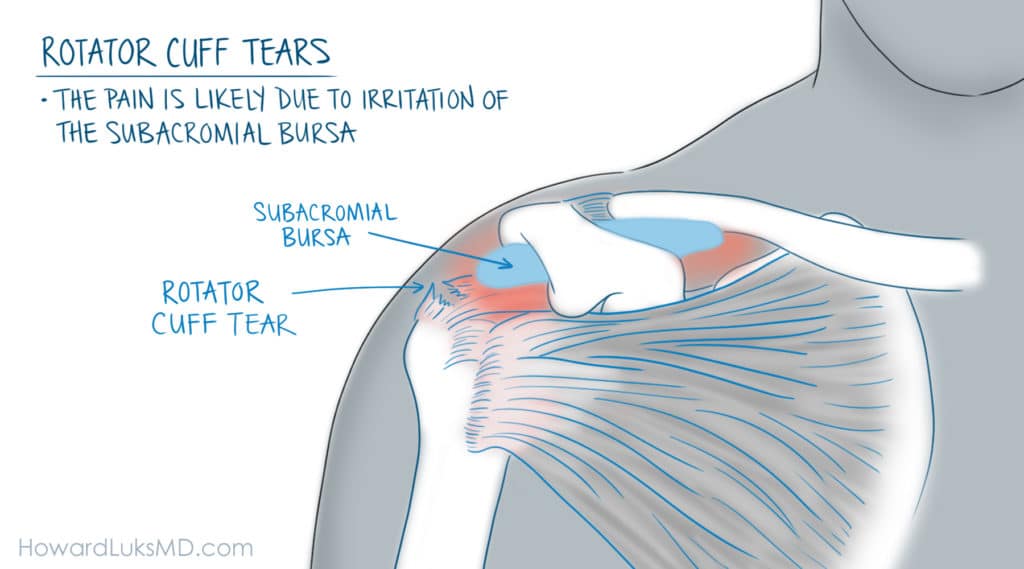

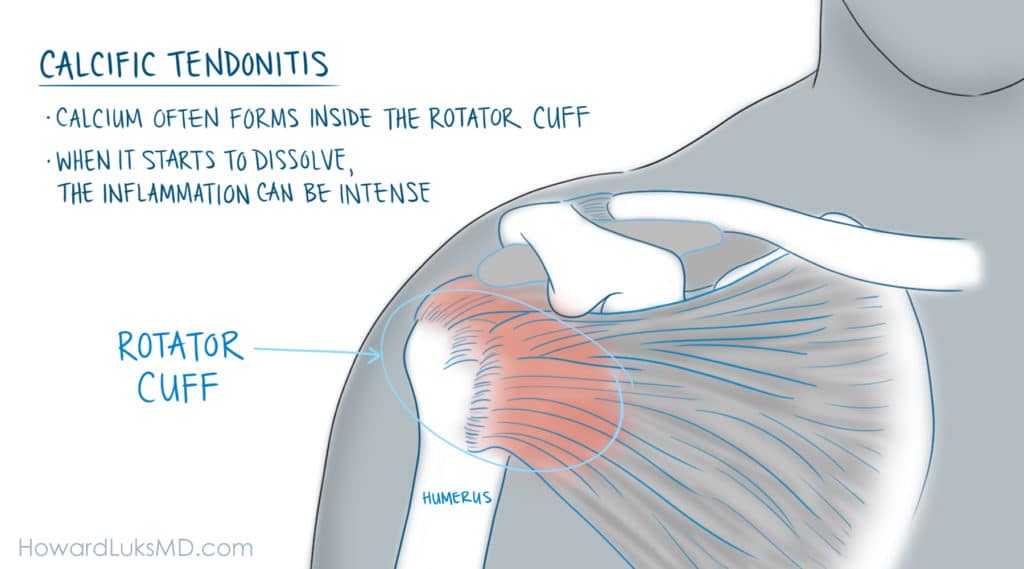




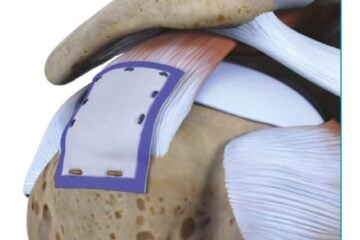
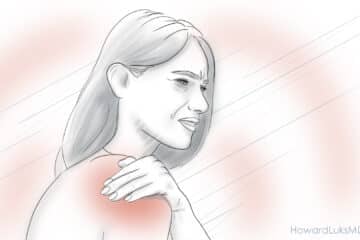

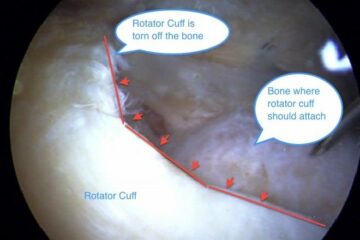








Nathan Frigerio
7 months after surgery, acromium impingement (type 3) Chondroplasty to both the humeral head and glenoid. MRI suggested small cuff tears of the supaspinatus, and infraspinatus. The surgeon didn’t remark on the infra.. the supra, <25% linear tear at the footplate. Doc didn't repair the supraspinatus tendon. I seemed to have aggravated it, appointments to come… My question(s) is/are: Not only sleep time hurts, but driving is torture. The pain goes down my upper forearm and finishes at the tip of my forefinger, actually, the finger is kind of numb. What, exactly causes these particular pains? Why is laying down for sleep so painful? Also pain behind the same shoulder around the scapula. Great writing, and explanations, by the way.
Thank you Nathan, I’m glad you found this useful.
We are not sure why the shoulder acts up so much at night.
A decompression- removal of the acromion – is not always met with success. Cuff disease.. or rotator cuff tendinopathy/tendinosis is a common cause of pain in some people. PT remains the best way to approach rotator cuff related pain if your surgeon feels that is the source of your pain.
In patients with chest wall pain, scapula pain and radiating pain or numbness in the forearm/fingers we often look to the neck as a potential source. Just something for you and your surgeon to potentially explore further.
Enrique Puig
Hi, just read this article because I’m worried about the pain in my right shoulder. I do know I have to see a doctor and stop playing doctor on Google but something that worried me when reading your article is that this tear will not heal and will continue progressing? At least this is what I understood.
I’ve been with this pain around three weeks now. It seemed to go but it returned back, not as painful as the beginning. The only thing different from the rest is that I had real sleep problems maybe the first day only. Now I do wake up but only if I sleep over my right arm or if I turn to sleep on a side on right shoulder. I’m still working out. Where some days I forget I have a shoulder injury and some it is a little painful. Thank you for your article and greetings from Uruguay, South America!
Hi Enrique!
Actually, only some tears become larger over time. Some tears might not become larger over time. Many people with severe shoulder pain do not even have a rotator cuff tear :-) Most just have some fraying (age-appropriate changes). Many radiologists read that as a “partial tear”- that’s not entirely accurate. Surgery for most partial tears is rarely necessary.
Good luck to you!
Sharon Strahan
I looked at a half dozen other websites before I found this one. The information provided was vastly superior to anything else. I appreciate the detail and expertise without the excessive medical terminology.
:-) Thank you! I’m super happy that you found it useful!
Beth
Your article was very helpful as I finally found a description of what I think might be going on with my shoulder. For the past several months I have been waking up several times at night with severe shoulder pain-impossible to get back to sleep. I have been using Naproxen and Tylenol plus heat and usually end up propped on pillows on my couch-then I might get an hour of not very restorative sleep. I am desperate for relief as I know my lack of sleep is affecting my ability to function during the day, and I am now falling asleep in the middle of the day because I am able to sleep then-the pain is still there but not so extreme. I have a history of falls on my shoulder that have been successfully treated with heat, massage, followed by exercises to mobilize and strengthen my shoulder. This episode is not directly related to any specific fall and is not responding well to my usual treatment. I am exhausted and really need some help. Cortisone injections have been very helpful for other injuries (knee and thumb). Maybe this is the way to go? Your thoughts? Thanks-Beth
HI Beth .. Night pain can truly be exhausting. An injection might help. A thorough history and exam by a shoulder doc should be able to pinpoint the issue .. eg. Bursitis, vs Calcific tendonitis, etc. Then they can determine if an injection can help and where the injection should be placed.
Kathryn Pember
Hi,
Wow I don’t know why I didn’t search night time shoulder pain sooner. This is exactly how I feel and it is AWFUL. I had a baby a week ago and did something to my shoulder either during labor or in the few days following birth. I had to wake up my significant other at 2am and make him bring me to the ER because I was so desperate for pain relief. I feel like knife is constantly stabbing me in the top of my shoulder. Ibuprofen I was prescribed isn’t helping at all! Well the Dr’s at the ER sent me home with the same regimen NSAID and Tylenol and I’m still waking up in excruciating pain around 2-3am. Currently my ice pack compression sleeve is helping me get sleep. My baby sleeps so well and it’s frustrating that I’m still awake when he isn’t! This new mom needs HELP! I’m going to call my primary physician tomorrow.
HI Kathryn,
You need a good examination by a good shoulder doc. Both the neck and shoulder can cause severe night pain in the shoulder region. If people are truly miserable we will often try an injection to calm things down. Further imaging may be needed depending on the examination and the xrays. Bursitis, calcific tendonitis, and
“pinched” nerves in the neck are the most common causes of shoulder pain at night.
Good luck to you.. and your newest member of your family.
Amy J Mattox
Thank you for this post !
Amy J.Mattox
Stanley levy
Dear Dr. Luk,
If possible and if you have time to respond to me than that would be greatly appreciated.
A few months ago I was trying to prevent a neighbor from falling down because of dizziness and in doing so I didn’t have proper leverage and I hurt my right shoulder as he was falling and my attempt of trying to keep him upright.
I had an MRI done and I would like to share it with you to see if you have any recommendations as far as physical therapy that may allow me to heal the tears if that is possible, rather then go through surgery which will take me out of work and be in a sling for at least 4 months.. I also have a very low tolerance for pain..Thank you for your interest in helping people, that is very commendable. The following is the MRI results..
Thanks,
Stan Levy
MRI date 11/16/17
Clinical Infomation..
Right shoulder pain with history of a lifting injury. Evaluate for rotator cuff tearing.
Comparison
None.
Contrast
None.
Technique
MR imaging of the right shoulder was performed, including the following pulse sequences, Corona T 1, coronal STIR, coronal T2, axial T2, sagittal STIR
Findings
Rotator Cuff: A small full-thickness tear of the supraspinatus tendon is seen at its greater tuberosity insertion posteriorly, measuring approximately 9 x 6 mm (series 105 image 10, series 109 image 1 5, series 104 image 5). Mild diffuse thinning of the supraspinatus tendon is seen in its distal 2 cm. The infraspinatus tendon shows mild tendinosis. There is also intermediate signal along the undersurface of the distal infraspinatus tendon, which could reflect mild undersurface tendon fraying. The teres minor and subsapularis tendons appear intact.
Muscles
The regional muscles show normal signal intensity and volume.
Biceps:
The Long-head of the biceps tendon shows a mild degree of tenosynovitis.
Subcromial/SubdeloidBursa:
A small amount of fluid is present in the subacromial/subdeltoid bursa.
Acromion/AC Joint: The anterior acromion shows a type of 1 flat undersurface. There is no lateral or anterior downsloping of the acromion, lateral subacromial enthesophyte formation, or osacromial. The acromiohumeral distance is narrowed to approximately 5 mm. There is a mild degree of osteoarthritic change at the acromioclavicular joint, without evidence of mass effect on the rotator cuff.
Glenohumeral Joint/Labrum: No discrete labral tear is seen. Capsular structures and articular surfaces appear intact. There is no significant glenohumeral joint effusion;
Bone Marrow:
Mild marrow edema and cystic change are seen in the distal clavicle adjacent to the acromioclavicular joint.
Impression:
1. A 9 x mm focal full-thickness tear of the distal posterior supraspinatus tendon fibers is seen in the right shoulder. There is diffuse attemuation of the distal 2 cm of the supraspinatus tendon, which may reflect more diffuse partial thickness tendon tearing or attritional/atrophic type change in the tendon.
2. Mild tendinosis of the infraspinatus with questionable mild undersurface tendon fraying distally.
3. Mild biceps tenosynovitis.
4. Small amount of fluid in the subacromial/subdeltoid bursa.
5. Mild osteoarthritic change at the acromioclavicular joint.
Hi ..
Many of these small rotator cuff tears are degenerative in nature. As your report says… the “diffuse attenuation” is likely due to time related degeneration. In all likelihood these findings were there before the incident in question. There is no “edema”, etc to lead one to believe that the tear is acute.
Depending on your age, nearly 25-50% of people are walking around with these tears and do not know it. Why some hurt and others do not we can not answer.
Most of these shoulders are treated with PT to see if the pain subsides and your function improves. Some of these tears might become larger over time (usually many years) while some tears do not become larger over time. We can not predict which tears might become larger. Therefore we monitor people who have been treated non-operatively with small tears like this.
Eric
The pain I wake up with at 5 AM is like a knife being twisted in both of my deltoids between the mussels. Very Very sore this morning.
Shoulder pain at night really can be awful….
Have a shoulder doc check out your shoulder. Various non-surgical treatments can work well at alleviating night pain.
Emilio
Thank you for this information. I had surgery in October of 2015 Arthroscopic Subacromial Decompression / Distal Clavicle Resection. And a bicep moved. I have popping when push my self up away from a table or when get up out of the recliner. I have a great amount of pain and discomfort during the day and especially at night. I have had Cortizone shots and I sleep in different positions. Nothing is help me. I’m just wondering if my Doctor is not see that I may a Rotator Cuff Tendinosis? I’m a Electrician and I always have tools above my head. What would you recommend that I do or say to my currant doctor?
Thank you
Megan
That whole article was written as if you were in my head, explaining my exact case. I prop pillows under both of my shoulders at night, after wrapping a blanket around them. The only comfort I have found besides doing this is sleeping with both arms above my head. The lack of sleep has been detrimental to my way of life and I have found myself feeling overwhelmed with every normal day activities simply because I do not have the energy to do them. I am sleepy throughout most of my days and I need a resolution, ASAP! I had my rotator cuff checked years ago and was told that I had hyperlaxity. Well, many years later I still have pain and it only seems to be getting worse. I LOVE that I found your page and that someone else knows how I feel. I am a Tricare Prime customer and am hoping that changing to a different Primary Care Physician will help resolve my issues!
a adlam
Thanks for you help
Erin Savior
Excellent Post .I experienced the same pain and so the post helpful me very much. It is very informative and explain the causes neatly and also mention the treatments its also good. Thanks for sharing this with us.
Clara Brown
I must agree, after reading through Dr Luk article, it was like this doctor is pinpointing every area I have pain and I have not seen him one time. OMG, I’m sadden to also know that the doctor only practice in New York and I live in La. At night I toss and turn and now the pain runs down my arm and with weakness to grip things. I was injured from a fall in Sept of 2019. But I need a Ortho that can lay it out like Dr Luk explains in his article.
Jeff
Excellent Post very informative Dr. Luks. Having a torn rotator cuff brings some serious pain to the shoulder and surrounding areas. Physical therapy and anti-inflammatory pills can really help even temporarily. However, what we have found with our patients who try our newly designed rapid release pro 2; also have seen significant reduction of pain in their shoulders. All while treating their pain naturally, without any pills or medications.
Noma
Thank you Dr Luks. I hurt myself in September and didn’t take it seriously. In October I went to do an XRAY at the nearest ER in Pasadena. No bone problems but recommended an orthopedic surgeon for further investigation. I felt like that was an exaggeration. But pain at night and the nerve pinching during the day on my neck and hands has led me to this article. It is so clear and empowering. Now I will confidently see my nearest orthopedic Dr. I now wish I was in NYC as I’ve recently moved here from NY. All the best with your super duper blog.
Liz
Hi, Thankyou for the informative site! It’s great!r Not getting to sleep is right! The pain/dull constant ache always seems worse at night! My left arm has a stabbing feeling on top of shoulder, with ache down the front, and side. It feels weak. It was diagnosed by ultrasound and X-ray with tendonitis, bursitis and spur, yet ROM is pretty good! (Cortisone did nothing to help, and I sit up most nights as it hurts to lie in bed, though doesn’t usually wake me once I get to sleep!
I have been told it needs an op. However, not until my first right arm improves..I’m actually 10 months post op for rotator cuff surgery (due to a car accident) for full thickness tear, bicep tenodesis, subacromial decompression and AC joint excision, CA ligament removed, bursar removed, etc. and have had severe inflammation ever since. A cortisone injection a month ago has made no difference. I can only raise my right arm forward to around shoulder height without pain/soreness..and sideways is not too great.. is this normal at this stage? I have a numb hand and elbow pain on inner and outer elbow, which has only been since the op..but was told it is probably not related to the surgery.For now I am told to give it time..around 18 months to heal..is this as good as it gets or how long until you know if the surgery actually failed? Many thanks!